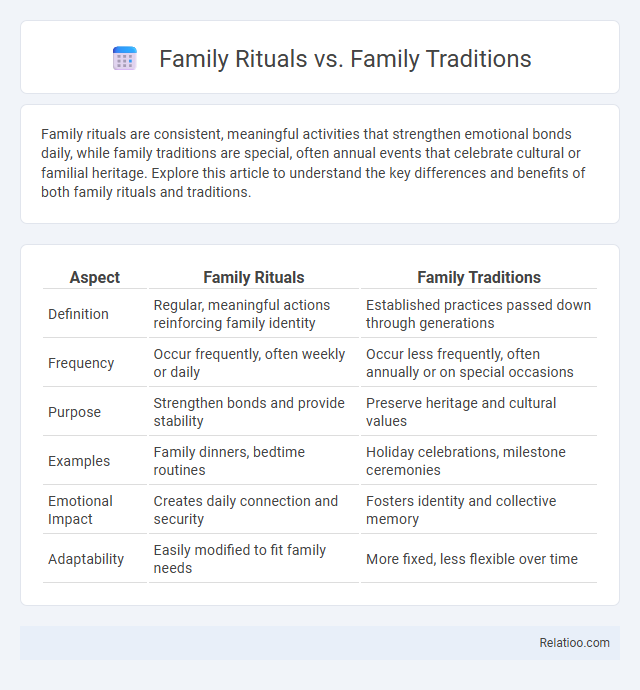Family rituals are consistent, meaningful activities that strengthen emotional bonds daily, while family traditions are special, often annual events that celebrate cultural or familial heritage. Explore this article to understand the key differences and benefits of both family rituals and traditions.
Table of Comparison
| Aspect | Family Rituals | Family Traditions |
|---|---|---|
| Definition | Regular, meaningful actions reinforcing family identity | Established practices passed down through generations |
| Frequency | Occur frequently, often weekly or daily | Occur less frequently, often annually or on special occasions |
| Purpose | Strengthen bonds and provide stability | Preserve heritage and cultural values |
| Examples | Family dinners, bedtime routines | Holiday celebrations, milestone ceremonies |
| Emotional Impact | Creates daily connection and security | Fosters identity and collective memory |
| Adaptability | Easily modified to fit family needs | More fixed, less flexible over time |
Understanding Family Rituals and Family Traditions
Family rituals are repetitive actions that create a sense of belonging and stability by reinforcing emotional connections within your family, often involving specific behaviors or routines. Family traditions are cultural or familial practices passed down through generations, embedding shared values, beliefs, and heritage. Understanding the distinction emphasizes how rituals serve as regular, meaningful interactions while traditions carry historical significance, both essential for nurturing family identity.
Key Differences Between Rituals and Traditions
Family rituals are specific, repeated actions with symbolic meaning that reinforce family bonds, such as weekly game nights or bedtime stories. Family traditions encompass broader cultural or familial customs passed down through generations, like holiday celebrations or annual reunions. The key difference lies in rituals emphasizing consistent, intentional behaviors with personal significance, while traditions often represent inherited practices rooted in collective identity and heritage.
The Psychological Impact of Family Rituals
Family rituals create predictable and meaningful interactions that enhance emotional security and strengthen bonds, fostering resilience in your family unit. Unlike family traditions, which are often annual or occasional events, rituals occur regularly and carry symbolic significance that supports identity and belonging. Psychological studies show consistent family rituals reduce stress, improve communication, and promote positive mental health by providing structure and a sense of continuity.
Traditions: Building Family Identity Over Generations
Family traditions serve as powerful tools for building family identity over generations by creating shared experiences and reinforcing values unique to your family history. Unlike family rituals, which are often repeated routines, traditions carry deeper cultural and emotional significance that strengthen the bond between family members. These time-honored practices help preserve heritage and provide a sense of belonging that shapes your family's collective identity.
How Rituals Enhance Everyday Family Life
Rituals, distinct from family traditions and routine habits, involve intentional, meaningful actions that reinforce family bonds and create a sense of belonging. You can enhance everyday family life by incorporating rituals that promote emotional connection, such as shared mealtime prayers or bedtime stories, fostering stability and predictability. Consistently practiced rituals improve communication and strengthen family identity, contributing to overall well-being and resilience.
Origins and Evolution of Family Traditions
Family traditions trace their origins to ancestral customs passed down through generations, evolving as families adapt cultural, religious, and social influences to reinforce identity and cohesion. Rituals, distinguished by their symbolic and repetitive nature, often serve as foundational elements within these traditions, offering meaning and structure to family gatherings or milestones. Your understanding of family rituals and traditions highlights their dynamic evolution, rooted in history yet continuously reshaped to reflect contemporary values and circumstances.
The Role of Rituals in Strengthening Family Bonds
Rituals serve as structured activities that create consistency and a sense of belonging within your family, differentiating themselves from broader family traditions, which often encompass cultural or generational practices. Family rituals, such as daily dinners or weekly game nights, foster emotional connection and reinforce shared values, enhancing trust and communication among members. Understanding the unique role rituals play in nurturing these bonds can help your family develop stronger, more resilient relationships.
Modern Adaptations of Family Traditions
Modern adaptations of family traditions blend cultural heritage with contemporary lifestyles, allowing families to personalize rituals while preserving meaningful connections. Family rituals, often repetitive acts providing structure and emotional comfort, differ from broader family traditions that encompass values and communal stories passed across generations. These evolved practices integrate technology, multicultural influences, and flexible formats to engage diverse family members and sustain bonding in dynamic social contexts.
Creating New Family Rituals and Traditions
Creating new family rituals and traditions fosters a sense of belonging and strengthens emotional bonds by establishing meaningful, repeated activities tailored to family values and milestones. Family rituals are often smaller, daily or weekly practices that provide routine and stability, while family traditions tend to be larger, less frequent events that reflect cultural heritage or shared history. Incorporating personalized rituals and traditions encourages connection, supports identity formation, and enhances family cohesion through intentional, consistent celebration.
Balancing Rituals and Traditions for Lasting Memories
Balancing family rituals and traditions creates meaningful experiences that strengthen bonds and build lasting memories. Rituals, typically daily or frequent practices like shared meals or bedtime stories, foster connection and stability, while traditions, often annual events such as holidays or cultural celebrations, offer a sense of identity and continuity. Integrating both ensures families cultivate routines that provide comfort and special occasions that highlight their unique heritage, enriching relationships across generations.

Infographic: Family Rituals vs Family Traditions
 relatioo.com
relatioo.com